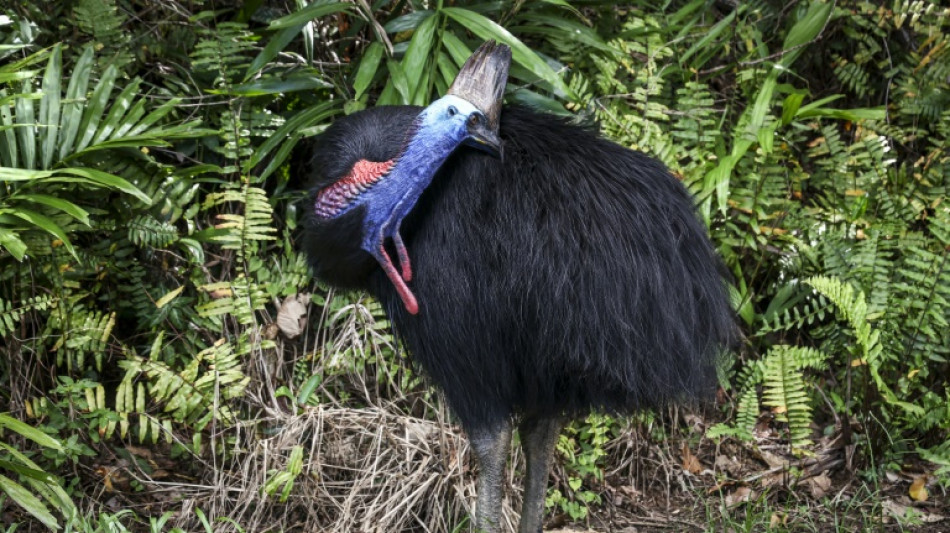
-
 Less Soviet, more inspiring: Kyrgyzstan seeks new anthem
Less Soviet, more inspiring: Kyrgyzstan seeks new anthem
-
Defending champion Kyren Wilson crashes out in first round of World Snooker Championship

-
 NASA's oldest active astronaut returns to Earth on 70th birthday
NASA's oldest active astronaut returns to Earth on 70th birthday
-
Exec linked to Bangkok building collapse arrested

-
 Zelensky says Russian attacks ongoing despite Putin's Easter truce
Zelensky says Russian attacks ongoing despite Putin's Easter truce
-
Vaibhav Suryavanshi: the 14-year-old whose IPL dream came true

-
 Six drowning deaths as huge waves hit Australian coast
Six drowning deaths as huge waves hit Australian coast
-
Ukrainian soldiers' lovers kept waiting as war drags on

-
 T'Wolves dominate Lakers, Nuggets edge Clippers as NBA playoffs start
T'Wolves dominate Lakers, Nuggets edge Clippers as NBA playoffs start
-
Taxes on super rich and tech giants stall under Trump

-
 Star Wars series 'Andor' back for final season
Star Wars series 'Andor' back for final season
-
Neighbours improvise first aid for wounded in besieged Sudan city

-
 Tariffs could lift Boeing and Airbus plane prices even higher
Tariffs could lift Boeing and Airbus plane prices even higher
-
Analysts warn US could be handing chip market to China

-
 Unbeaten Miami edge Columbus in front of big MLS crowd in Cleveland
Unbeaten Miami edge Columbus in front of big MLS crowd in Cleveland
-
Social media helps fuel growing 'sex tourism' in Japan

-
 'Pandora's box': alarm bells in Indonesia over rising military role
'Pandora's box': alarm bells in Indonesia over rising military role
-
Alaalatoa hails 'hustling hard' Brumbies for rare Super Rugby clean sheet

-
 Trio share lead at tight LA Championship
Trio share lead at tight LA Championship
-
Sampdoria fighting relegation disaster as old heroes ride into town

-
 Recovering pope expected to delight crowds at Easter Sunday mass
Recovering pope expected to delight crowds at Easter Sunday mass
-
Nuggets edge Clippers in NBA playoff overtime thriller, Knicks and Pacers win

-
 Force skipper clueless about extra-time rules in pulsating Super Rugby draw
Force skipper clueless about extra-time rules in pulsating Super Rugby draw
-
DEA MARIJUANA SCAM: As DEA Cannabis Program Implodes This 4/20, MMJ Stands Alone in Pursuit of Real Medicine

-
 Nuggets edge Clippers in NBA playoff overtime thriller, Pacers thump Bucks
Nuggets edge Clippers in NBA playoff overtime thriller, Pacers thump Bucks
-
Unbeaten Miami edge Columbus in front of big crowd in Cleveland

-
 Kim takes one-shot lead over Thomas, Novak at RBC Heritage
Kim takes one-shot lead over Thomas, Novak at RBC Heritage
-
Another round of anti-Trump protests hits US cities

-
 'So grateful' - Dodgers star Ohtani and wife welcome first child
'So grateful' - Dodgers star Ohtani and wife welcome first child
-
PSG maintain unbeaten Ligue 1 record, Marseille back up to second

-
 US, Iran report progress in nuclear talks, will meet again
US, Iran report progress in nuclear talks, will meet again
-
US Supreme Court intervenes to block Trump deportations

-
 Hamas armed wing says fate of US-Israeli captive unknown
Hamas armed wing says fate of US-Israeli captive unknown
-
Pacers thump Bucks to open NBA playoffs

-
 Sabalenka reaches Stuttgart semis as Ostapenko extends Swiatek mastery
Sabalenka reaches Stuttgart semis as Ostapenko extends Swiatek mastery
-
Zelensky says Ukraine will observe Putin's Easter truce but claims violations

-
 'Fuming' Watkins fires Villa in bid to prove Emery wrong
'Fuming' Watkins fires Villa in bid to prove Emery wrong
-
DR Congo boat fire toll revised down to 33

-
 England thrash Scotland to set up France Grand Slam showdown
England thrash Scotland to set up France Grand Slam showdown
-
Verstappen's Red Bull 'comes alive' to claim record pole in Jeddah

-
 McTominay fires Napoli level with Inter as Conte fuels exit rumours
McTominay fires Napoli level with Inter as Conte fuels exit rumours
-
Rajasthan unleash Suryavanshi, 14, as youngest IPL player but lose thriller

-
 Man City boost top five bid, Aston Villa thrash in-form Newcastle
Man City boost top five bid, Aston Villa thrash in-form Newcastle
-
Villa rout Newcastle to rekindle bid to reach Champions League

-
 Dumornay gives Lyon lead over Arsenal in Women's Champions League semis
Dumornay gives Lyon lead over Arsenal in Women's Champions League semis
-
Trans rights supporters rally in London, Edinburgh after landmark ruling

-
 'We have to wait': Barca's Flick on Lewandowski injury fear
'We have to wait': Barca's Flick on Lewandowski injury fear
-
Bordeaux-Begles backups edge Pau to close in on Top 14 summit

-
 Trans rights supporters rally outside in London, Edinburgh after landmark ruling
Trans rights supporters rally outside in London, Edinburgh after landmark ruling
-
PSG beat Le Havre to stay on course for unbeaten Ligue 1 season


Australia's fearsome 'dinosaur bird' stares down extinction
With legs like a velociraptor and a striking neon blue neck, the southern cassowary cuts a fearsome figure in the rainforests of northeast Australia.
It is best to admire these human-sized birdies -- and their rapier-sharp 10 centimetre (four inch) talons -- from afar.
"It's a modern-day dinosaur," said Peter Rowles, the rugged president of a community group protecting the endangered birds.
Fiercely territorial, when threatened they hiss and make a deep rumbling boom.
"When you first look at them eye to eye, that can be intimidating, because they've got big eyes, and they look straight at you and they do look a bit fierce," said Rowles.
These flightless birds are only found in Australia, New Guinea and some Pacific islands.
The Australian government lists them as endangered and estimates about 4,500 remain in the wild.
They are considered a "keystone species", meaning they play a vital role in maintaining biodiversity and helping spread seeds in the rainforest.
If cassowaries go extinct, the rainforests will suffer.
"We thought if we could save cassowaries, we also could save enough habitat to keep a lot of other species alive," Rowles explained.
His group is doing what it can to save these formidable birds, which stand 1.5 metres (five feet) tall and can weigh up to 75 kilos (165 pounds).
This includes making signs urging drivers to slow down, redesigning roads to better protect native habitats and running a cassowary hospital for injured birds.
The main threats to the cassowary are car strikes, clearing of native habitats, dog attacks and climate change.
"Cassowaries are not aggressive when they're treated well," said Rowles, with few recorded deaths caused by the species.
A young Australian boy was killed in 1926 after he chased the bird, who severed his jugular vein, while a Florida man perished in 2019 when his pet cassowary attacked.
- 'Naturally cranky birds' -
In the past 300 years, about 100 of Australia's unique flora and fauna species have been wiped off the planet.
This rate of extinction will likely increase, according to the World Wide Fund for Nature (WWF).
"There is so much that has to be done and resources are not available to have a significant impact," said Darren Grover, WWF Australia's acting chief conservation officer.
"We're looking at around 2,000 species on the Australian government's threatened species list and more and more species are added to that list yearly," he added.
Threats include climate change, habitat loss and invasive species, Grover said.
The Australian government has a national recovery plan underway to save the iconic cassowary bird -- as it does with many other species -- that includes working with Indigenous and conservation groups.
Much of the country's conservation efforts focus on protecting keystone species, a concept developed by zoologists in the 1960s.
Grover said this is the best approach when resources are limited, as it provides flow-on effects to other animals in that habitat.
But this strategy can only go so far, he warned: "I don't think we can ever do enough to save our wildlife in Australia."
"Cassowaries are amazing species and whenever you get to see them in the wild is fantastic," he said.
"But be careful because they are naturally cranky birds, they are big and powerful and we need to give them some space."
D.Cunningha--AMWN



